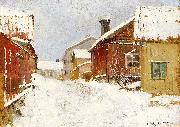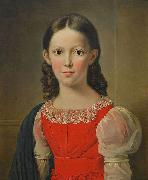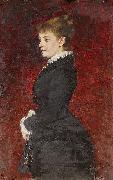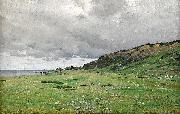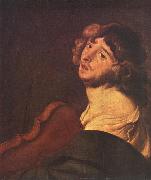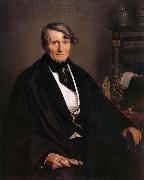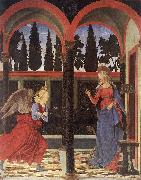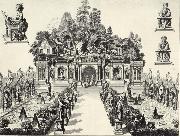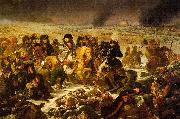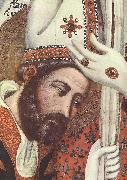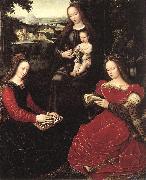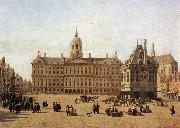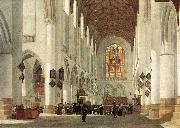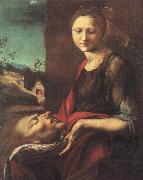|
|
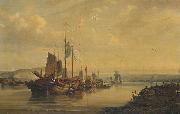 |
Auguste Borget
|
|
Auguste Borget (1808-1877) was a French artist who is best known for his drawings and prints of exotic places, in particular China. He was born in 1808 in Issoudun, Indre. At age 21, he went to Paris where he became a close friend of Honore de Balzac. Borget periodically exhibited at the Paris Salon from 1836 to 1859. Beginning in 1836, he traveled through North and South America before stopping briefly in Honolulu in May, 1838, on board the ship "Psyche", on a world tour. He went to Canton in September 1838 and stayed in the region for 10 months. While in Canton, he met the English artist George Chinnery, and they went on sketching trips together.
In July 1839 he visited Manila, Singapore and Calcutta. In 1840 he traveled widely in India, returning to Paris in the summer of that year. Borgetes sketches and watercolors from China were the basis for his most famous publication "Sketches of China and the Chinese", published in 1842. His book "La Chine ouverte" was illustrated with fine woodcut engravings. A major Salon of his original works, including watercolors and boldly executed oil paintings was held in Paris in 1843. Borget died in 1877. |
|
|
|
|
|
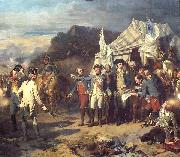 |
Auguste Couder
|
|
(1 April 1790 in Paris - 21 July 1873 in Paris) was a French painter and student of Jean-Baptiste Regnault and Jacques Louis David. He joined the Academie des beaux-arts in 1839 and was an officer of the Legion d'honneur. He married Cornelie Stouf, daughter of the sculptor Jean-Baptiste Stouf.
Couder was buried in the cemetery of Pere-Lachaise.
|
|
|
|
|
|
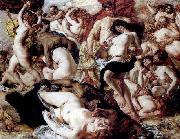 |
Auguste Leveque
|
|
(b. Nivelles, Walloon Brabant 1866 - d. Saint-Josse-ten-Noode, 1921) is a Belgian painter influenced both by realism and symbolism. Leveque was also a sculptor, poet and art theoretician.
He studied under Jean-François Portaels at the Academie Royale des Beaux-Arts in Brussels, and received the Prix Godecharle for his painting Job in 1890.
Leveque was a member of the "Salon d'Art Idealiste", formed by Jean Delville in Brussels in 1896, which is considered the Belgian equivalent to the Parisian Rose & Cross Salon. Other members of the group were Leon Frederic, Albert Ciamberlani, Constant Montald, Emile Motte, Victor Rousseau, Armand Point and Alexandre Seon. The Salon was abandoned in 1898. |
|
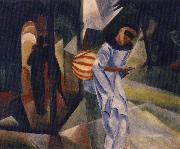 |
auguste macke
|
|
August Macke (1887-1914) was a German painter whose harmonious and simple scenes of everyday life made a unique contribution to Expressionism. |
|
|
|
|
|
|
|
|
|
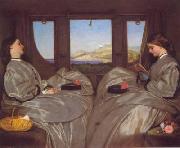 |
Augustus Egg
|
|
(2 May 1816 - 26 March 1863) was a Victorian artist best known for his modern triptych Past and Present (1858), which depicts the breakup of a middle-class Victorian family.
Augustus Egg was born in London on 2 May 1816 to Joseph and Ann Egg, and baptised in St James's Church, Piccadilly on 30 May 1816. He had an elder brother, George Hine Egg.
His father Joseph Egg was a wealthy gunsmith from the distinguished gun making family, who immigrated to London from Huningue, Alsace. Egg was educated in the schools of the Royal Academy, beginning in 1836. Egg was a member of The Clique, a group of artists founded by Richard Dadd and others in the late 1830s (c. 1837). Egg sought to combine popularity with moral and social activism, in line with the literary work of his friend Charles Dickens. With Dickens he set up the "Guild of Literature and Art", a philanthropic organisation intended to provide welfare payments to struggling artists and writers. He acted the lead role in a play written by Edward Bulwer-Lytton to raise funds for the organisation. His self-portrait in the role is in Hospitalfield House in Arbroath.
Egg's early paintings were generally illustrations of literary subjects. Like other members of The Clique, he saw himself as a follower of Hogarth. His interest in Hogarthian moral themes is evidenced in his paired paintings The Life and Death of Buckingham, depicting the dissolute life and sordid death of the Restoration rake. Yet his paintings often took a humorous look at their subjects, as in his Queen Elizabeth Discovers she is no longer Young (1848).
Unlike most other members of The Clique, Egg also admired the Pre-Raphaelites; he bought work from the young William Holman Hunt and shared ideas on color theory with him. His own triptych, known as Past and Present, was influenced by Hunt's work. The triptych depicted three separate scenes, one portraying a prosperous middle-class family and the other two depicting poor and isolated figures e two young girls in a bedsit and a homeless woman with a baby. The viewer was expected to read a series of visual clues that linked together these three scenes, to reveal that the prosperous family in the central scene is in the process of disintegrating because of the mother's adultery. The two outer scenes depict the separated mother and children a few years later, now living in poverty. The painting's use of flashback e the central scene is occurring in the past e has been seen as a precursor of cinema.
Egg was also an active organiser of exhibitions, being admired by fellow-artists for his dedication and fair mindedness. He was one of the organisers of the Manchester Art Treasures Exhibition in 1857. He was elected to the Royal Academy in 1860.
Always in poor health, Egg spent his later years in the warmer climate of continental Europe, where he painted Travelling Companions, an ambiguous image of two near-identical young women that has sometimes been interpreted as an attempt to represent two sides of the same person. A member of the circle of friends that included Dickens and Wilkie Collins, Egg features in their surviving correspondence. He participated, as actor and costume designer, in their amateur theatricals, which were often conducted for charitable purposes as noted above. In January 1857 he took a part in Collins's play The Frozen Deep, which starred Dickens and was performed at his home, Tavistock House (Egg played John Want, the ship's cook.) The production was also acted before Queen Victoria and then performed for charity. Dickens described Egg as a "dear gentle little fellow," "always sweet-tempered, humorous, conscientious, thoroughly good, and thoroughly beloved."
He died in Algiers, Algeria in 1863.
|
|
|
|
|
|
|
|
|
|
|
|
|
|
|
|
|
|
|
|
|
|
|
|
|
|
|
|
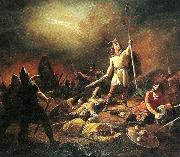 |
axel gustaf hertzberg
|
|
1832-1878
Axel Gustaf Hertzberg född 27 augusti 1832 i Jämtland, död 2 september 1878 i Dusseldorf , Tyskland var en svensk bildkonstnär.
Hertzberg ägnade sig först åt porträtteckning och litografi men övergick senare till oljemåleri. Han studerade vid konstakademien i Stockholm 1849-1860. Han gjorde en resa till Finland där han stannade två år. Därefter studerade han konst i Paris, och slutligen Dusseldorf.
Hertzberg blev 1867 agre vid konstakdemien i Stockholm. |
|
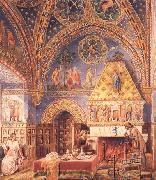 |
Axel Haig
|
|
Swedish etcher and architectural draughtsman , 1835-1921 |
|
|
|
|
|
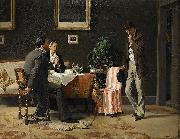 |
Axel Kulle
|
|
painted Den forlorade sonens aterkomst in1882 |
|
|
|
 |
Ayne Bru
|
|
Ayne (Aine) Bru (probably a Catalanization of Hans Bren) was a 16th century Renaissance painter of German origin who worked in Catalonia. He may have proceeded from Lummen, in the Duchy of Brabant. He is sometimes also called Lucius de Brun. His surname may also suggest provenance from the town of Brenn.
In 1502, he was hired to paint the main altar (retablo) in the church of the monastery of Sant Cugat del Valles, for which he was paid a staggering wage between 1504 and 1507.
On the central panel, Bru depicted the martyrdom of Saint Cucuphas (in Catalan, Sant Cugat) with enormous realism. The executioner cuts the saint's throat while Cucuphas remains tied to a tree trunk. Nearby, there appear another knife (in a basket) and a dog sleeping peacefully. This work is now at the National Art Museum of Catalonia (Museu Nacional d'Art de Catalunya).
The dog from Bru's painting of Cucuphas' martyrdom was later borrowed by Salvador Dale for a painting called "Dale Contemplating Nude" or "Dale Dale Dale".
The vast countryside that serves as a background anachronistically includes the actual monastery of Sant Cugat. Another panel, depicting Saint George (sometimes identified as Saint Candidus or simply as "Warrior Saint"), was attached to this one. It has been rejoined and is visible at the National Art Museum of Catalonia.
Marcel Durliat believes that though the expressionism in this painting is evidence of a Germanic artistic tradition, Bru's Quattrocento depiction of the standing figures in contemporary dress, as well as other details, indicate that the painter may have lived or studied in Northern Italy before moving to Barcelona. |
|
|
|
|
|
|
|
|
|
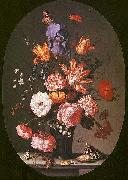 |
Balthasar van der Ast
|
|
(1593/94 - 1657) was a Dutch Golden Age painter who specialized in still lifes of flowers and fruit, as well as painting a number of remarkable shell still lifes; he is considered to be a pioneer in the genre of shell painting. His still lifes often contain insects and lizards. He was born in Middelburg and died at Delft.
|
|
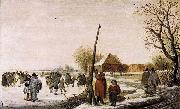 |
Barend Avercamp
|
|
(1612-1679) was a Dutch painter.
Avercamp was born in Kampen and was taught by his uncle Hendrick Avercamp, who was also a painter. Barent primarily painted scenes depicting Netherlands in winter. He was a member of the Guild of Saint Luke, and traveled around the Netherlands including Zwolle and Zutphen for his settings and inspiration.
|
|
|
|
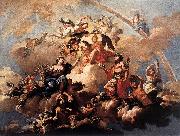 |
Bartolomeo Altomonte
|
|
Bartolomeo Altomonte, also known as Bartholomäus Hohenberg (24 February 1694 - 11 November 1783), was an Austrian baroque painter who specialized in large scale frescoes. He was the son of Martino Altomonte, also a painter. |
|
|
|
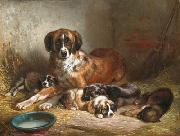 |
Benno Adam
|
|
(July 15, 1812, Munich - March 9, 1892, Kehlheim) was a German painter.
He specialised in animal portraits and market and hunting scenes.
He was the son of painter Albrecht Adam.
|
|
|
|
|
|
|
|
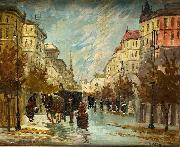 |
Berkes Antal
|
|
(1874-1938) was a Hungarian painter, born in Budapest, Hungary. Lived in Paris for some time and produced cityscapes there as well as similar street scenes of Budapest and Vienna.
He studied at The Academy of Fine Arts between 1889-1894 in Budapest, Hungary. He first started painting landscapes, and later changed to painting street scenes of Budapest. His popularity and sales increased so he started "mass producing" many of his works, meeting the requirements of the art dealers of his age. His work went through light and dark periods as he experimented with light.
|
|
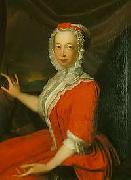 |
Bernardus Accama
|
|
(1697, Burum? - 1756, Leeuwarden) was an eighteenth century Dutch historical and portrait painter, born in Friesland. Active in Leeuwarden.
|
|
|
|
|
|








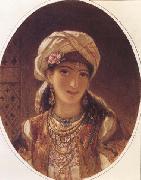
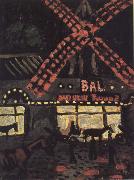


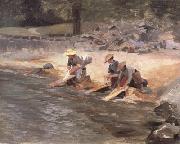


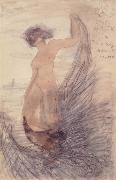
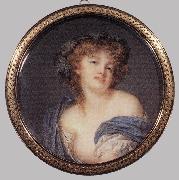
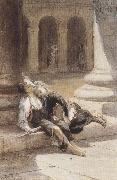
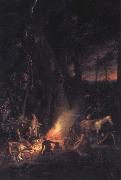


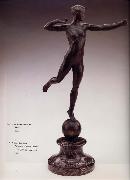
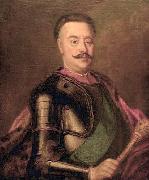
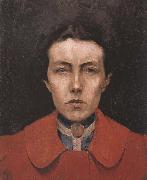
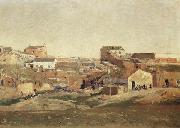
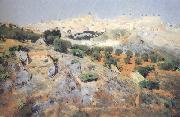
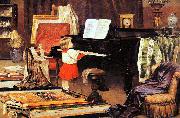
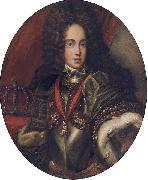
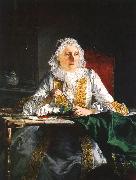

 Efimovich Arkhipov-576333.jpg)
